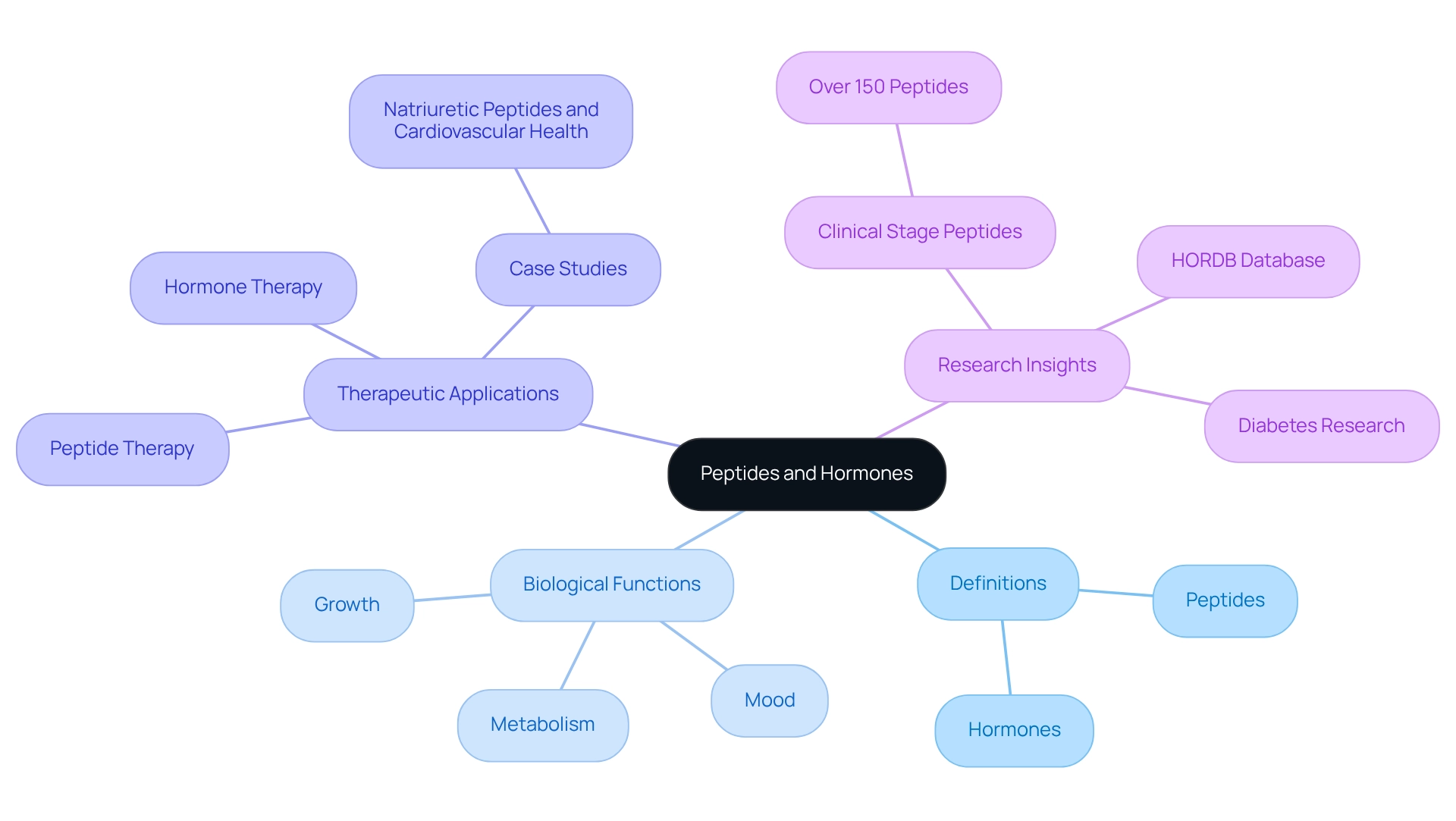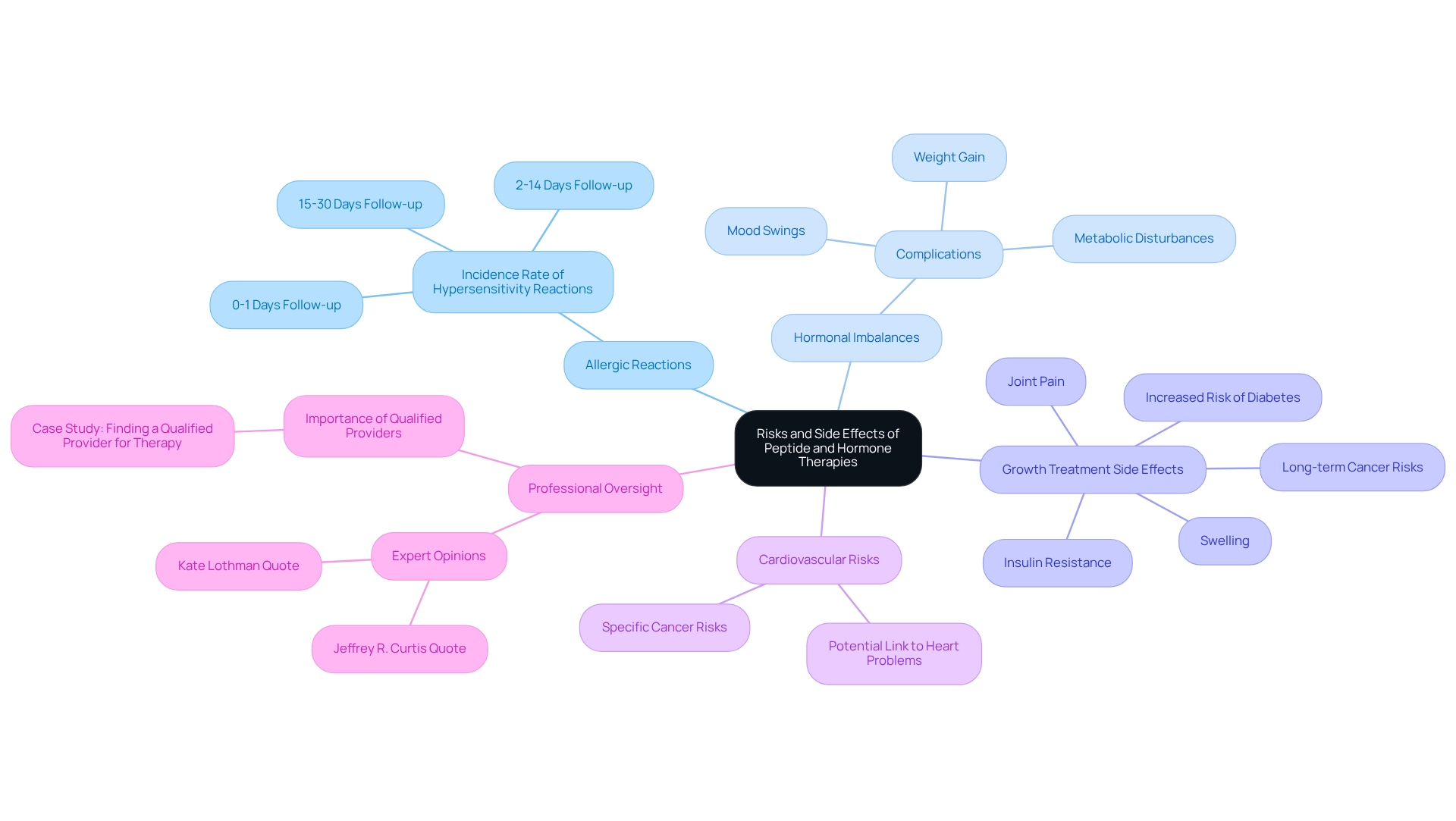Understanding Peptide and Hormone Therapy: Benefits, Risks, and More
Overview
Peptide and hormone therapy presents a range of benefits, such as improved metabolic functions, enhanced mood, and relief from symptoms linked to hormonal deficiencies, particularly in aging individuals. These therapies can effectively restore hormonal balance, promote muscle growth, and alleviate menopause-related symptoms. As a result, they significantly enhance overall well-being and quality of life.
Furthermore, exploring these therapies can lead to a deeper understanding of their positive impact. By addressing hormonal imbalances, individuals may experience not only physical improvements but also emotional and psychological benefits. This holistic approach to health is essential for those seeking to improve their quality of life as they age.
In addition, the integration of peptide and hormone therapy into one’s health regimen can serve as a proactive measure against age-related decline. It’s crucial to consider these options as part of a comprehensive health strategy. By doing so, individuals can take charge of their well-being and enjoy a more vibrant, fulfilling life.
Introduction
In the quest for optimal health and longevity, understanding the roles of peptides and hormones is crucial. These powerful biological molecules not only regulate essential physiological processes but also offer innovative therapeutic options that can enhance well-being. As research advances, over 150 peptides have entered clinical trials, showcasing their potential in treating various health conditions, including diabetes and cardiovascular issues.
This article delves into the fundamentals of peptides and hormones. It explores how therapies leveraging these molecules work, their benefits, and the types currently available. Furthermore, it highlights the importance of safety and monitoring in these treatments, providing a comprehensive guide for those considering peptide and hormone therapies as part of their health journey.
Define Peptides and Hormones: Key Concepts for Health
Peptides are brief sequences of amino acids connected by bonds, which play a crucial role in various biological functions, particularly in the context of peptide and hormone therapy for hormone regulation. Hormones, produced by glands in the endocrine system, are essential chemical messengers that are targeted in peptide and hormone therapy to influence numerous physiological processes, including metabolism, growth, and mood. Understanding these definitions is essential, as they lay the groundwork for discussing proteins and treatments aimed at enhancing well-being and longevity, especially through quality nutrition and innovative interventions.
Recent statistics indicate that over 150 proteins have reached the clinical stage, underscoring their growing importance in therapeutic applications. For instance, a case study on natriuretic substances, released by cardiac myocytes in response to stress, reveals their protective mechanisms against cardiovascular and renal conditions. This study emphasizes the potential of small proteins in developing improved treatment strategies for managing blood pressure and overall cardiovascular health, especially with the application of peptide and hormone therapy. The presence of small proteins and substances in medical therapies is significant, with ongoing research deepening our understanding of their roles in conditions such as diabetes. The HORDB database serves as a vital resource for researchers in biochemistry and pharmacology, facilitating a deeper comprehension of protein and signaling molecule functions. Experts assert that proteins are essential components of wellness enhancement strategies, and when combined with peptide and hormone therapy, they assist in regulating bodily functions and play a vital role in various biological activities. By exploring these concepts, individuals can better appreciate the benefits of protein and endocrine treatments in their health journeys, aligning with insights from ByKomi.com on anti-aging nutrition and innovative health strategies.

Explain How Peptide and Hormone Therapies Work
Peptide and hormone therapy treatments work by augmenting or imitating the body’s natural substances, effectively reinstating equilibrium and enhancing physiological functions. For instance, peptide and hormone therapy typically involves the delivery of specific peptides that promote essential biological functions, such as the secretion of growth hormone or the improvement of insulin sensitivity. Peptide and hormone therapy, which includes hormone replacement therapies like estrogen and testosterone, aims to counteract hormonal deficiencies, alleviating symptoms such as fatigue, mood swings, and reduced libido.
Peptide and hormone therapy can significantly enhance metabolic functions, boost energy levels, and support overall well-being. Research indicates that understanding the mechanisms behind these treatments can unlock their full healing potential, leading to improved health outcomes. For example, case studies have demonstrated that compounded bioidentical hormone replacement treatment (BHRT) can alleviate menopause-related symptoms, such as sleep disturbances and irritability, providing substantial relief for women during this transitional phase. As noted by BMS, “All 21 menopause-associated symptoms assessed were significantly reduced after compounded BHRT treatment, including difficulty in sleeping, feeling tired or lacking in energy, loss of interest in sex, sweating at night, irritability, feeling tense or nervous, and hot flushes.”
Furthermore, the effectiveness of these therapies is underscored by expert insights, which highlight their role in enhancing quality of life. As regulatory authorities modify frameworks to ensure the safety and effectiveness of peptide and hormone therapy, the growing body of evidence supports their application in addressing issues related to hormonal imbalances. Additionally, SSRIs, typically used as antidepressants, may also help alleviate intense hot flashes and improve mental health symptoms in menopausal women, showcasing the dual benefits of hormonal treatments.
Outline the Benefits of Peptide and Hormone Therapies
Peptide and hormone therapy offers a wide array of benefits that are particularly appealing to those focused on anti-aging. Peptide treatments are well-known for promoting muscle growth, improving skin elasticity, and aiding in fat loss, making them integral to many anti-aging regimens. For instance, compounds like BPC-157 and TB-500 have been shown to accelerate recovery from injuries and enhance joint health, leading to faster healing and reduced inflammation for individuals suffering from joint pain or sports injuries. VYVE Wellness tailors treatment plans to align with each individual’s health goals, ensuring a personalized approach that meets the distinct needs of every patient.
Furthermore, rapamycin has emerged as a noteworthy contender in the anti-aging arena. Initially discovered in soil bacteria on Easter Island, rapamycin acts as an inhibitor of the mTOR pathway, which governs cellular growth, metabolism, and aging. By inhibiting mTOR, rapamycin influences various cellular processes related to aging, such as protein synthesis, autophagy, and mitochondrial function. Preclinical studies indicate that rapamycin can extend lifespan and enhance healthspan in various model organisms, positioning it as a promising candidate for addressing age-related decline and promoting longevity.
In addition to peptides, peptide and hormone therapy plays a vital role in improving quality of life. They can alleviate symptoms of menopause, enhance mood, and increase libido, which are significant concerns for aging individuals. The safety profile of these treatments suggests a shift in medical practice toward prevention rather than merely treating age-related diseases. Moreover, peptide and hormone therapy supports metabolic health, enhances cognitive function, and increases overall vitality, making it an attractive option for those looking to maintain their health as they age.
Real-world examples illustrate the effectiveness of these treatments. Patients often report increased energy levels and a renewed sense of vitality upon starting their treatment, highlighting its positive impact on daily life. As the field of protein treatment continues to evolve, it provides a variety of solutions for muscle gain, fat loss, and anti-aging, reinforcing its value for health-conscious individuals aiming to age gracefully. As VYVE Wellness states, “Our team of experts is here to guide you through every step of the process, ensuring that you get the most out of your treatment.” This support is crucial for individuals navigating their wellness journeys. The rising popularity of protein treatment within alternative wellness circles further underscores its importance and acceptance in the wellness community, aligning with ByKomi.com’s mission to promote a youthful body as individuals age.
Identify Types of Peptides and Hormones Used in Therapy
Protein treatment has gained popularity in recent years, with various forms of proteins demonstrating advantages for different health issues. Among the most prevalent are growth factor-releasing compounds (GHRPs), which effectively trigger the release of growth factors, promoting muscle development and fat reduction.
Another important category consists of glucagon-like peptide-1 (GLP-1) analogs, essential in controlling blood sugar levels, rendering them especially beneficial for individuals managing diabetes; furthermore, peptide and hormone therapy are commonly employed to tackle specific deficiencies.
Estrogen, progesterone, and testosterone are frequently prescribed to help balance hormonal levels, particularly in aging populations. The widespread use of peptide and hormone therapy indicates an increasing acknowledgment of their significance in preserving wellness and vitality.
As we look toward 2025, the field of peptide and hormone therapy continues to progress, with improvements in administration techniques and compositions enhancing their efficacy. For instance, the North American therapeutic market is expected to expand at a remarkable rate of 8.2%, fueled by the rising occurrence of chronic diseases and the robust healthcare system backing innovative treatments. Additionally, the RTU/standard commercial parenteral nutrition market is projected to experience a 7% compound annual growth rate (CAGR) from 2023 to 2032, indicating a broader trend in the growth of related therapeutic markets.
Real-world applications of GLP-1 analogs have demonstrated significant success in blood sugar regulation, showcasing their potential as a cornerstone in diabetes management. Moreover, most compounds are degraded through the dipeptidyl peptidase enzyme pathway, which lowers the risk for long-term negative effects, thereby improving their safety profile.
Understanding these therapeutic alternatives enables individuals to make educated choices about their health interventions, ultimately resulting in better outcomes and enhanced quality of life. As Dr. Lohit Khera points out, the changing role of microRNA in research and diagnostics emphasizes the groundbreaking progress in peptide treatments, highlighting their possible influence on precision medicine.
Discuss Risks and Side Effects of Peptide and Hormone Therapies
Peptide and hormone therapy offers potential advantages, yet it comes with inherent risks that necessitate careful evaluation. Common side effects may include allergic reactions, as documented in various studies. For example, the incidence rate of hypersensitivity reactions (HSRs) for biologics can vary significantly, with some studies reporting rates as high as 10% in specific populations. This underscores the importance of individualized assessment and monitoring during treatment. Hormonal imbalances present another concern, potentially leading to complications such as mood swings, weight gain, and metabolic disturbances.
In the context of growth treatment, possible side effects include joint pain, swelling, insulin resistance, and an increased risk of diabetes. Long-term use may also correlate with a heightened risk of certain cancers. This scenario emphasizes the necessity for professional oversight and monitoring to effectively mitigate these risks.
Moreover, there is an increased risk of severe medical issues associated with these treatments. Research indicates a possible link between peptide and hormone therapy and cardiovascular problems, as well as specific cancers, necessitating comprehensive discussions with healthcare professionals prior to initiation. Real-world examples highlight these risks; patients undergoing hormone replacement treatment have reported side effects ranging from mild discomfort to severe health complications, reinforcing the importance of professional oversight.
Case studies further illustrate the significance of collaborating with skilled healthcare professionals who are well-versed in hormone treatments. For instance, a case study titled “Finding a Qualified Provider for Therapy” highlights how working with a licensed healthcare professional ensures the use of high-quality substances and adherence to ethical standards, thereby enhancing treatment effectiveness while minimizing risks. Expert opinions consistently advocate for a cautious approach; as Jeffrey R. Curtis states, “The safety and oversight of protein treatments are essential to attaining desired results without jeopardizing patient well-being.” Similarly, Kate Lothman underscores the value of professional oversight, asserting that “engaging with experienced providers can make a substantial difference in treatment success.”
Consequently, individuals considering these treatments should engage in thorough discussions to evaluate their personal health profiles and establish appropriate monitoring protocols throughout their treatment journey. It is also crucial to acknowledge that the World Anti-Doping Agency has prohibited the use of most compounds and all steroids among athletes, highlighting the broader implications and risks associated with protein treatments, particularly in competitive settings.

Guide to Starting Peptide and Hormone Therapy
Starting peptide and hormone therapy begins with a consultation with a healthcare provider who specializes in these interventions. This preliminary gathering involves a thorough assessment, incorporating blood tests and an extensive medical history, to customize the most appropriate treatment for the individual. Once a personalized treatment plan is established, adherence to the prescribed dosage and schedule is crucial. Regular follow-up appointments are essential for monitoring progress and making necessary adjustments to the treatment.
Adopting a healthy lifestyle can greatly improve the efficacy of these treatments. Engaging in at least 150 minutes of moderate aerobic activity or 75 minutes of vigorous activity each week is recommended to support overall health. Notably, statistics indicate that trans men had a higher percentage of fractures relative to cisgender women, underscoring the importance of maintaining a healthy lifestyle in this demographic. Furthermore, a well-rounded diet abundant in vital nutrients enhances the advantages of peptide and hormone treatment.
Expert insights indicate that initiating hormonal treatment safely requires grasping the potential risks and benefits. Ada S. Cheung, MBBS (Hons), FRACP, PhD, observes that in trans men, absolute and relative muscle mass and strength rise with gender-affirming treatment and are greater than those of cisgender women but still lower than cisgender men. This highlights the importance of ongoing communication with healthcare providers to ensure a safe and effective treatment journey. Statistics show that a considerable number of individuals pursuing protein treatments consult healthcare providers, reflecting the increasing interest in these innovative options. Additionally, Semaglutide, a GLP-1 agonist recognized for assisting in insulin release and appetite control, illustrates how treatment can influence wellness results, especially in weight management. By following established guidelines and maintaining a proactive approach to health, individuals can effectively navigate the initiation of peptide and hormone therapy.
Conclusion
Understanding the intricate roles of peptides and hormones is essential for anyone considering therapies aimed at enhancing health and longevity. These biological molecules not only regulate key physiological processes but also present innovative therapeutic options that can significantly improve well-being. With over 150 peptides currently in clinical trials, the potential for effective treatments in conditions like diabetes and cardiovascular issues is becoming increasingly evident.
Peptide and hormone therapies operate by restoring balance to the body’s natural systems, leading to numerous benefits such as improved metabolic function, enhanced energy levels, and better overall quality of life. Tailored approaches, such as customized peptide therapy plans, ensure that individuals receive treatments that align with their unique health goals. Furthermore, advancements in the understanding of these therapies, including the promising impact of substances like rapamycin, highlight their relevance in the ongoing conversation about anti-aging and health optimization.
However, it is crucial to approach these therapies with caution, recognizing the potential risks and side effects that may arise. Professional guidance and monitoring are vital to ensure safety and efficacy, as highlighted by various studies and expert opinions. Engaging with qualified healthcare providers can significantly enhance treatment outcomes while minimizing health risks.
As individuals embark on their health journeys, a comprehensive understanding of peptide and hormone therapies empowers them to make informed decisions. By integrating these therapies with a healthy lifestyle, individuals can enhance their chances of achieving optimal health and longevity. The growing body of research and clinical evidence underscores the importance of these innovative treatments in modern health care, paving the way for a future where individuals can age gracefully while maintaining vitality and well-being.
Frequently Asked Questions
What are peptides and what role do they play in biological functions?
Peptides are brief sequences of amino acids connected by bonds, and they play a crucial role in various biological functions, particularly in peptide and hormone therapy for hormone regulation.
How do hormones function in the body?
Hormones are essential chemical messengers produced by glands in the endocrine system, influencing numerous physiological processes such as metabolism, growth, and mood.
What is the significance of peptide and hormone therapy?
Peptide and hormone therapy aims to augment or imitate the body’s natural substances, reinstating equilibrium and enhancing physiological functions, such as promoting growth hormone secretion and improving insulin sensitivity.
What are some symptoms that peptide and hormone therapy can alleviate?
These therapies can alleviate symptoms related to hormonal deficiencies, including fatigue, mood swings, and reduced libido.
How can peptide and hormone therapy impact overall well-being?
Peptide and hormone therapy can significantly enhance metabolic functions, boost energy levels, and support overall well-being.
What are some specific benefits of compounded bioidentical hormone replacement treatment (BHRT)?
BHRT can alleviate menopause-related symptoms such as sleep disturbances, irritability, and other menopause-associated symptoms, providing substantial relief for women during this transitional phase.
What evidence supports the effectiveness of peptide and hormone therapy?
Research and case studies demonstrate that these therapies can lead to improved health outcomes and enhance quality of life, especially in addressing hormonal imbalances.
How do regulatory authorities view peptide and hormone therapy?
Regulatory authorities are modifying frameworks to ensure the safety and effectiveness of peptide and hormone therapy, which is supported by a growing body of evidence.
Can SSRIs be related to hormone therapy?
Yes, SSRIs, typically used as antidepressants, may also help alleviate intense hot flashes and improve mental health symptoms in menopausal women, showcasing the dual benefits of hormonal treatments.






